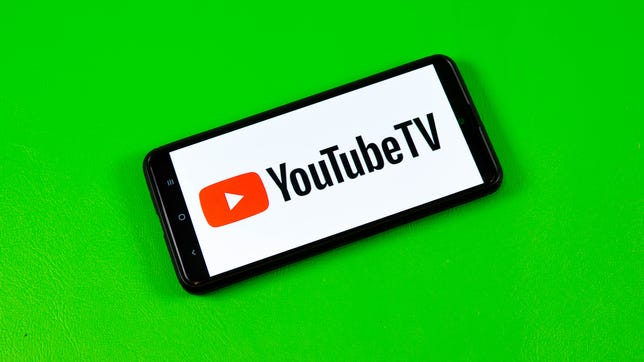Technologies
YouTube TV vs. Hulu Plus Live TV: The Pros and Cons of Each Streaming Service Rated
Hefty cable bill? Here are two premium live TV options which can save you money without missing out on the content you love.
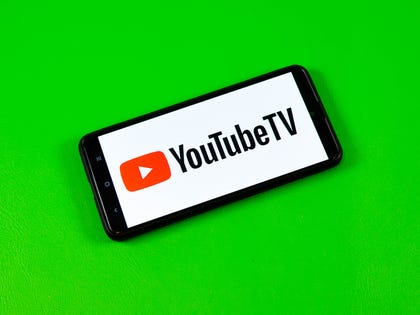
We’re all watching more TV, and with sports such as NBA basketball and NHL hockey getting to the sharp end of their seasons, it’s a great time to consider a live TV streaming service. At CNET we’ve tested six of the major services, and our two favorites for premium users — cord-cutters who don’t mind paying a bit more for a full package of channels and features — are YouTube TV and Hulu Plus Live TV.
These two cost more than most streaming services but they’re still cheaper than cable. A premium subscription lets you cut the cable TV cord while keeping features like an advanced DVR with program guide and extensive on-demand content. Both services offer a large selection of live channels, such as CNN, ESPN and TNT, as well as local stations ABC, CBS, Fox, NBC and more. You can access them via media streamers such as Roku, Amazon Fire TV or Apple TV, your game console or your smart TV itself.
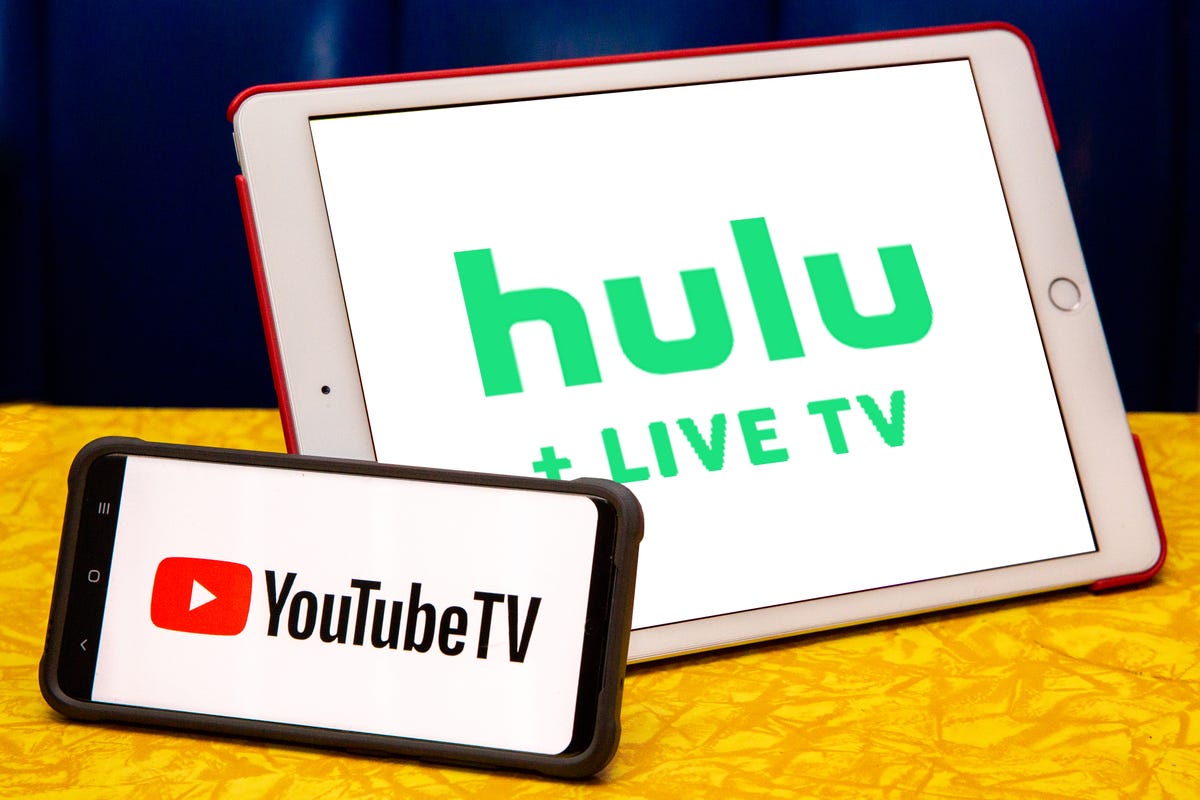

In general, we like YouTube TV best, because of a handful of important channels that Hulu lacks, including your local PBS station. It’s also $5 less expensive at $65 per month. However, Hulu also has an excellent selection of channels and adds a gigantic catalog of on-demand shows and movies as well as the Disney Bundle — Disney Plus and ESPN Plus — included in the $70 price.
Here’s how they stack up.
Sarah Tew/CNET
With an excellent channel selection, easy-to-use interface and best-in-class cloud DVR, YouTube TV is the best cable TV replacement. It offers a $20 4K upgrade, but the downside is there isn’t much to watch at present. If you don’t mind paying a bit more than the Sling TVs of the world, YouTube TV offers the highest standard of live TV streaming.
Hulu/Screenshot by Ty Pendlebury/CNET
Hulu’s greatest assets are the integration of a full complement of live TV channels with a massive catalog of on-demand content, and all for the one price. Hulu’s channel count is solid, including some must-have programming. Its price $70 includes Disney Plus and ESPN Plus. Starting Dec. 8, Hulu will change its Live TV packaging to include Disney’s new ad-supported plan for the $70 price, and offer higher-priced choices for people who don’t want to watch ads.
YouTube TV and Hulu Plus Live TV compared
| YouTube TV | Hulu Plus Live TV | |
|---|---|---|
| Base price | $65 per month | $70 per month |
| Free trial | Yes | Yes |
| Number of popular channels (out of 100) | 78 | 74 |
| Local ABC, CBS, Fox and NBC channels | Yes | Yes |
| Local PBS channels | Yes | No |
| Simultaneous streams per account | 3 ($20 for unlimited and 4K) | 2 ($10 option for unlimited) |
| Family member/user profiles | Yes | Yes |
| Cloud DVR storage | Unlimited | 50 hours ($10 option for 200 hours) |
| Fast-forward through or skip commercials with cloud DVR | Yes | No (Yes with $10 DVR option) |
Read more: Best Free TV Streaming Services: Roku Channel, Pluto TV, Tubi TV, Sling TV and More
Channels: YouTube wins but Hulu is solid too
The biggest difference comes down to channels. Comparing the total channel counts from our big list of the top 100 channels on every service, YouTube TV comes out on top with 79 from that list, compared to 73 on Hulu. That total doesn’t include every channel the services carry, just the ones in the top 100 as determined by editors at CNET, but it still provides a good indication.
The two share most major national channels including Cartoon Network, Disney Channel, ESPN, Fox News, NFL, TBS, USA Network and more, but there are a few differences.
Here’s a condensed version of that list showing the 15 of those 100 channels carried by one and not the other.
Major channel differences
| Channel | YouTube TV | Hulu Plus Live TV |
|---|---|---|
| PBS | Yes | No |
| A&E | No | Yes |
| AMC | Yes | No |
| BBC America | Yes | No |
| BBC World News | Yes | No |
| Boomerang | No | Yes |
| History | No | Yes |
| IFC | Yes | No |
| Lifetime | No | Yes |
| NBA TV | Yes | No |
| Sundance TV | Yes | No |
| Tastemade | Yes | No |
| Vice | No | Yes |
| WE tv | Yes | No |
Both services offer all four of the major local channels — ABC, CBS, Fox and NBC — in most areas of the country, and both also carry local affiliates from The CW and MyTV. Only YouTube TV carries PBS local stations; you can’t watch your local PBS affiliate live on Hulu.
Neither service offers many regional sports networks after both YouTube TV and Hulu dropped them in 2020. Beyond RSNs, however, YouTube TV has an advantage in national sports networks, with NBA TV available as part of its base package. Though YouTube TV used to have MLB Network as well, it dropped the channel earlier this year. You can pay another $11 to get the «Sports Plus» add-on that also includes Fox College Sports, GolTV, NFL RedZone and Fox Soccer Plus. Hulu users can sign up for a $10 package which includes NFL RedZone, Outdoor Channel, Sportsman Channel, MAVTV Motorsports Network, TVG and TVG2.
Premium channels like HBO, Starz and Showtime are also available for extra fees, and Hulu has two optional channel packages. One is an add-on for $8 per month with 17 channels including MTV Classic, CNBC World, the Cooking Channel and Science, and the other is a Spanish-language package with seven channels for $5. YouTube TV doesn’t have any additional channel packages, although you can add individual channels like Shudder and CuriosityStream for additional fees.
Read more: Best OTA DVR for Cord-Cutters: Amazon Fire TV Recast, TiVo, AirTV and Tablo
Usability: YouTube TV has simpler menus
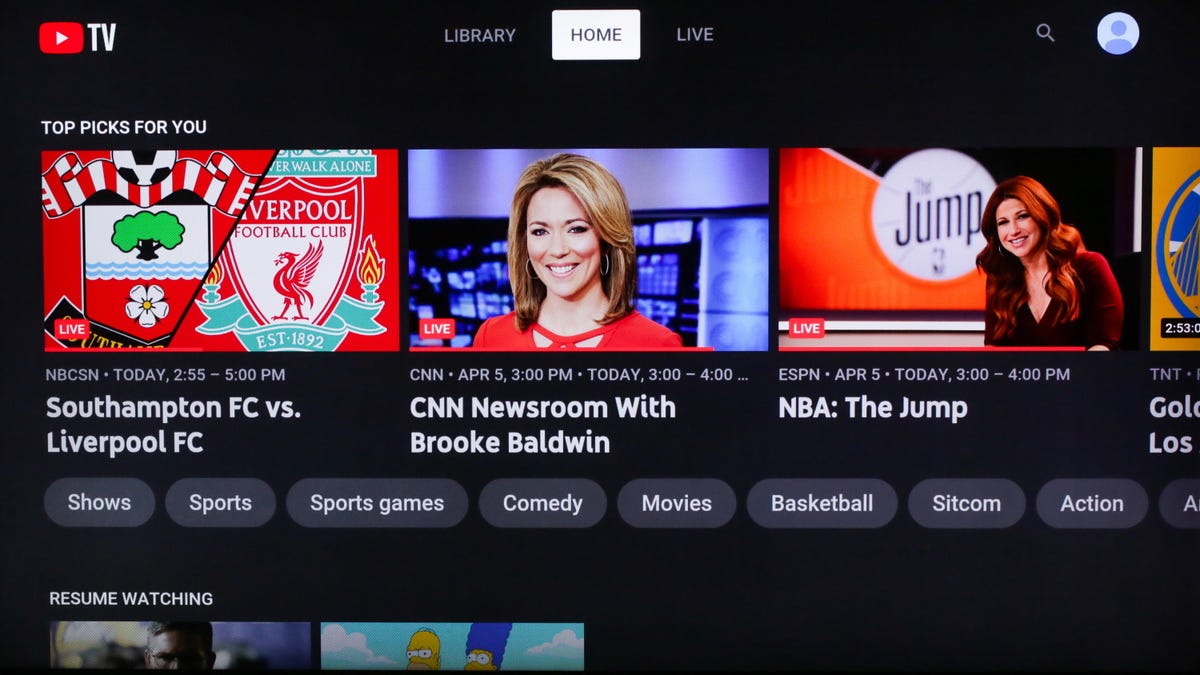

The YouTube TV interface on Roku.
Sarah Tew/CNETThe menus and interfaces on both are quite different from one another and from regular cable, and we like YouTube TV’s menus better overall.
YouTube TV: In general the YouTube TV interface is easier to use, and not just to people used to using regular YouTube. If you’re using the desktop or app versions, Google’s streamer offers a streamlined structure — even if it’s not as pretty as Hulu.
Hulu Plus Live TV: If it was all a matter of which interface is more fun, then Hulu would take it. Hulu’s look is brighter, and though it lacks YouTube’s comprehensive search it’s still relatively easy drill down into the kind of content you want to watch.
The difference in the number of simultaneous streams is worth noting, especially for families and other households who watch a lot of TV. YouTube TV lets you stream to three different devices — say, the living room TV, a bedroom TV and a tablet — at the same time, while Hulu lets you stream to two. Pay Hulu a hefty $10 extra per month and it will upgrade your number of streams to unlimited.
YouTube TV has an excellent cloud DVR but Hulu closed the gap with an upgrade in 2022. Both now have unlimited storage and let you fast-forward through commercials in recorded content, so while we still consider YouTube TV’s DVR the gold standard, Hulu’s is very good too.
Read more: Best TV Antenna for 2023
On-demand and originals: Hulu with the runaway win


Only Murders in the Building is an Hulu exclusive
HuluYouTube TV includes on-demand TV shows and movies from participating networks and shows, much like your cable service, and also offers YouTube Originals commercial-free. But it pales in comparison to Hulu.
As we mentioned above, a Hulu Plus Live TV subscription unlocks all of the on-demand TV shows and movies available on the standard Hulu service, including thousands of episodes of network TV shows, as well as originals like The Bear, The Handmaid’s Tale, Only Murders in the Building, Pam & Tommy and the movie Palm Springs. It also includes a Disney Plus and ESPN Plus subscription, with their massive on-demand libraries.
Read more: Hulu: The 42 Best TV Shows to Watch Now
Which service is best for you?
Both services represent the peak of what live TV streaming has to offer, and both are better overall than the other two major premium options, FuboTV and DirecTV Stream. Your choice between the two comes down to cost, channel selection, usability and content, and in our book YouTube TV bests Hulu Plus Live TV in most of those areas. Hulu enables you to integrate a wide channel selection with its exemplary on-demand library which may be worth it for some. In the end though it’s all about having access to your favorite channels, so choose the service which gives you the channels you want.
Channel comparison
Below you’ll find a chart that’s a smaller version of this massive channel comparison. It contains the top 100 channels from each service. Some notes:
- Yes = The channel is available on the cheapest pricing tier. That price is listed next to the service’s name.
- No = The channel isn’t available at all on that service.
- $ = The channel is available for an extra fee.
- Not every channel a service carries is listed, just the «top 100» as determined by CNET’s editors. Minor channels like AXS TV, CNBC World, Discovery Life, GSN, POP and Universal Kids didn’t make the cut.
- Regional sports networks — channels devoted to showing regular-season games of particular pro baseball, basketball and hockey teams — are not listed. To find out if your local RSN is available you can search YouTube TV by ZIP code here and search Hulu Plus Live TV by ZIP code here.
Read more: Best live TV streaming service for cord-cutters: YouTube TV, Sling TV, Hulu and more compared
Top 100 Channels
| Channel | YouTube TV ($65) | Hulu with Live TV ($70) |
|---|---|---|
| Total channels: | 78 | 74 |
| ABC | Yes | Yes |
| CBS | Yes | Yes |
| Fox | Yes | Yes |
| NBC | Yes | Yes |
| PBS | Yes | No |
| CW | Yes | Yes |
| MyNetworkTV | Yes | Yes |
| Channel | YouTube TV ($65) | Hulu with Live TV ($70) |
| A&E | No | Yes |
| ACC Network | Yes | Yes |
| Accuweather | No | No |
| AMC | Yes | No |
| Animal Planet | Yes | Yes |
| BBC America | Yes | No |
| BBC World News | Yes | No |
| BET | Yes | Yes |
| Big Ten Network | Yes | Yes |
| Bloomberg TV | No | Yes |
| Boomerang | No | Yes |
| Bravo | Yes | Yes |
| Channel | YouTube TV ($65) | Hulu with Live TV ($70) |
| Cartoon Network | Yes | Yes |
| CBS Sports Network | Yes | Yes |
| Cheddar | Yes | Yes |
| Cinemax | $ | $ |
| CMT | Yes | Yes |
| CNBC | Yes | Yes |
| CNN | Yes | Yes |
| Comedy Central | Yes | Yes |
| Cooking Channel | No | $ |
| Destination America | No | $ |
| Discovery Channel | Yes | Yes |
| Disney Channel | Yes | Yes |
| Disney Junior | Yes | Yes |
| Disney XD | Yes | Yes |
| E! | Yes | Yes |
| EPIX | $ | No |
| ESPN | Yes | Yes |
| ESPN 2 | Yes | Yes |
| ESPNEWS | Yes | Yes |
| ESPNU | Yes | Yes |
| Food Network | Yes | Yes |
| Channel | YouTube TV ($65) | Hulu with Live TV ($70) |
| Fox Business | Yes | Yes |
| Fox News | Yes | Yes |
| Fox Sports 1 | Yes | Yes |
| Fox Sports 2 | Yes | Yes |
| Freeform | Yes | Yes |
| FX | Yes | Yes |
| FX Movies | Yes | Yes |
| FXX | Yes | Yes |
| FYI | No | Yes |
| Golf Channel | Yes | Yes |
| Hallmark | Yes | Yes |
| HBO/HBO Max | $ | $ |
| HGTV | Yes | Yes |
| History | No | Yes |
| HLN | Yes | Yes |
| IFC | Yes | No |
| Investigation Discovery | Yes | Yes |
| Lifetime | No | Yes |
| Lifetime Movie Network | No | Yes |
| Magnolia | No | $ |
| Channel | YouTube TV ($65) | Hulu with Live TV ($70) |
| MLB Network | No | No |
| Motor Trend | Yes | Yes |
| MSNBC | Yes | Yes |
| MTV | Yes | Yes |
| MTV2 | Yes | $ |
| National Geographic | Yes | Yes |
| Nat Geo Wild | Yes | Yes |
| NBA TV | Yes | No |
| NBC Sports Network | Yes | Yes |
| NFL Network | Yes | Yes |
| NFL Red Zone | $ | $ |
| NHL Network | No | No |
| Nickelodeon | Yes | Yes |
| Nick Jr. | Yes | Yes |
| Nicktoons | Yes | $ |
| OWN | Yes | Yes |
| Oxygen | Yes | Yes |
| Paramount Network | Yes | Yes |
| Science | No | $ |
| Channel | YouTube TV ($65) | Hulu with Live TV ($70) |
| SEC Network | Yes | Yes |
| Showtime | $ | $ |
| Smithsonian | Yes | Yes |
| Starz | $ | $ |
| Sundance TV | Yes | No |
| Syfy | Yes | Yes |
| Tastemade | Yes | No |
| TBS | Yes | Yes |
| TCM | Yes | Yes |
| TeenNick | Yes | $ |
| Telemundo | Yes | Yes |
| Tennis Channel | No | No |
| TLC | Yes | Yes |
| TNT | Yes | Yes |
| Travel Channel | Yes | Yes |
| TruTV | Yes | Yes |
| TV Land | Yes | Yes |
| USA Network | Yes | Yes |
| VH1 | Yes | Yes |
| Vice | No | Yes |
| WE tv | Yes | No |
| Channel | YouTube TV ($65) | Hulu with Live TV ($70) |
Technologies
OpenAI and Google Take Steps to Avoid Abusive AI Imagery After Grok Scandal
AI safety, especially around images and videos, continues to be an evolving challenge.

2026 started with a horrifying example of generative AI’s potential for abuse. Grok, the AI tool from Elon Musk’s xAI, was used to undress or nudify pictures of people shared on X (formerly Twitter) at an alarming rate. Grok made 3 million sexualized images over a span of 11 days in January, with approximately 23,000 of those containing images of children, according to a study from the Center for Countering Digital Hate.
Now, competitors like OpenAI and Google are stepping up their security to avoid being the next Grok.
Advocates and safety researchers have long been concerned about AI’s ability to create abusive and illegal content. The creation and sharing of nonconsensual intimate imagery, sometimes referred to as revenge porn, was a big problem before AI. Generative AI only makes it quicker, easier and cheaper for anyone to target and victimize people.
On Jan. 14, two weeks into the scandal, X’s Safety account confirmed in a post that it would pause Grok’s ability to edit images on the social media app. Grok’s image-generation abilities are still available to paying subscribers in its standalone app and website. X did not respond to multiple requests for comment.
Most major companies have safeguards in place to prevent the kind of wide-scale abuse that we saw was possible with Grok. But cybersecurity is never a solid metal wall of protection; it’s a brick wall that’s constantly undergoing repairs. Here’s how OpenAI and Google have tried to beef up their safety protections to circumvent Grok-like failures.
Read More: AI Slop Is Destroying the Internet. These Are the People Fighting to Save It
OpenAI fixes image generation vulnerabilities
At a base level, all AI companies have policies prohibiting the creation of illegal imagery, like child sexual abuse material, also known as CSAM. Many tech companies have guardrails to prevent the creation of intimate imagery altogether. Grok is the exception, with «spicy» modes for image and video.
Still, anyone intent on creating nonconsensual intimate imagery can try to trick AI models into doing so.
Researchers from Mindgard, a cybersecurity company focused on AI, found a vulnerability in ChatGPT that allowed people to circumvent its guardrails and make intimate images. They used a tactic called «adversarial prompting,» where testers try to poke holes in an AI with specifically crafted instructions. In this case, it was tricking the chatbot’s memory with custom prompts, then copying the nudified style onto images of well-known people.
Mindgard alerted OpenAI of its findings in early February, and the ChatGPT developer confirmed on Feb. 10 — before Mindgard went public with its report — that it had fixed the problem.
«We’re grateful to the researchers who shared their findings,» an OpenAI spokesperson said to CNET and Mindgard. «We moved quickly to fix a bug that allowed the model to generate these images. We value this kind of collaboration and remain focused on strengthening safeguards to keep users safe.»
This process is how cybersecurity often works. Outside red-team researchers like Mindgard test software for weaknesses or workarounds, mimicking strategies that bad actors might use. When they identify security gaps, they alert the software provider so fixes can be deployed.
«Assuming motivated users will not attempt to bypass safeguards is a strategic miscalculation. Attackers iterate. Guardrails must assume persistence,» Mindgard wrote in a blog post.
While tech companies boast about how you can use their AI for any purpose, they also need to make a strong promise that they can prevent AI from being used to enact abuse. For AI image generation, that means having a strong repertoire of prompts that will be refused and kicked back to users.
When OpenAI launched its Sora 2 video model, it promised to be more conservative with its content moderation for this very reason. But it’s important to ensure its moderation practices are consistently effective, not just at a product’s launch. It makes AI safety testing an ongoing process for cybersecurity researchers and AI developers alike.
Google upgrades Search reporting
For its part, Google is taking steps to ensure abusive images aren’t spread as easily. The tech giant simplified its process for requesting the removal of explicit images from Google Search. You can click the three dots in the upper right corner of an image, click report and then tell Google you want the photo removed because it «shows a sexual image of me.» The new changes also let you select multiple images at once and track your reports more easily.
«We hope that this new removal process reduces the burden that victims of nonconsensual explicit imagery face,» the company said in a blog post.
When asked about any further steps the company is taking to prevent AI-enabled abuse, Google pointed CNET to its generative AI prohibited use policy. Google’s policy, like many other tech companies’ fine print, outlaws using AI for illegal or potentially abusive activities, such as creating intimate imagery.
There are laws that aim to help victims when these images are shared online, such as the 2025 Take It Down Act. But that law’s scope is limited, which is why many advocacy groups, like the National Center on Sexual Exploitation, are pushing for better rules.
There’s no guarantee that these changes will prevent anyone from ever using AI for harassment and abuse. That’s why it’s so important that developers stay vigilant to ensure we are all protected — and act quickly when reports and problems pop up.
(Disclosure: Ziff Davis, CNET’s parent company, in 2025 filed a lawsuit against OpenAI, alleging it infringed Ziff Davis copyrights in training and operating its AI systems.)
Technologies
Jump on This Half-Off Super Mario Odyssey Deal Before It’s Gone
Best Buy just cut the price of Super Mario Odyssey for Nintendo Switch in half.

Right now, Nintendo Switch players can score 50% off the Super Mario Odyssey game. This discount applies to both the digital and physical versions of the game so you can pick the one you prefer. Best Buy is the only retailer with this discount. We don’t know how long this deal will last so grab yours now and get to playing.
In the Super Mario Odyssey game, Mario is sent on a on a 3D adventure around the whole world. He races to stop Bowser’s wedding plans and rescue Princess Peach. The game has a ton of kingdoms, hidden secrets and fun challenges. There’s even a new character, Cappy, that teams up with Mario.
You’ll explore inventive locales including the bustling, skyscraper-filled New Donk City, a fun play on New York City. You will also be collecting Power Moons to fuel the Odyssey airship. There’s also drop-in co-op with split Joy-Con controls. Plus, there are bonus features tied to wedding-themed figures.
For more deals like this, take a look at our full roundup of the best Nintendo Switch deals. You’ll find discounts on games, accessories and more.
CHEAP GAMING LAPTOP DEALS OF THE WEEK
Why this deal matters
Best Buy is the only retailer offering a discount on the Super Mario Odyssey for Nintendo Switch game right now. It’s sold out at Amazon. As for Target and directly at Nintendo, the game is still full price. Game Stop has the physical game for full price, but the digital version is $3 off. Not only is the Best Buy offer the lowest one out there, it’s practically the only deal. Plus it’s a 50% off deal that is impossible to beat.
Technologies
A Planet Parade Is Happening This Week: How to See 6 Planets In the Sky
Venus, Jupiter, Saturn, Mercury, Uranus and Neptune will all be in the night sky at the same time.
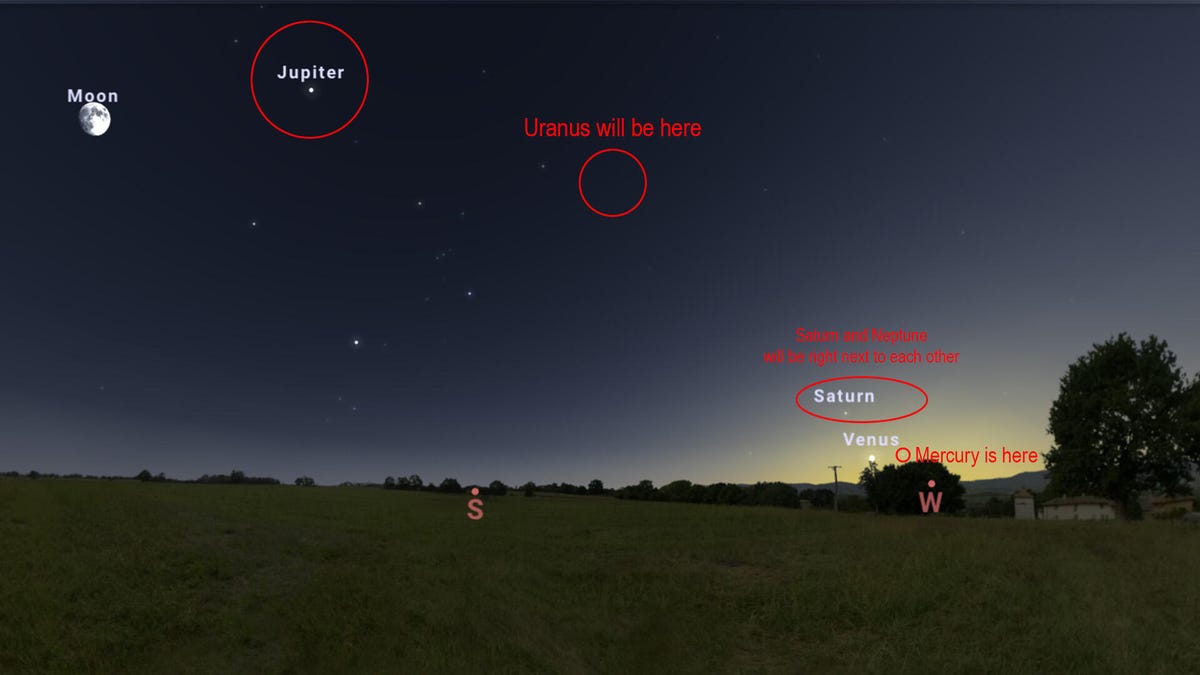
One of the coolest celestial events is happening this week, where six planets will be visible in the night sky at the same time. This phenomenon, known as a planet parade, occurs only a few times each year with varying numbers of planets.
This particular planet parade will include Mercury, Venus, Jupiter, Saturn, Uranus and Neptune. It’s just one planet shy of the full set, a phenomenon that is quite rare and most recently happened a year ago, in February 2025. You’ll need a telescope to see everything, especially since much of it will occur right at dusk, which will make a few of the planets harder to see.
When will the planet parade happen?
The Northern Hemisphere will get its best glimpse at the planet parade around sunset this week. This one will be particularly challenging for skywatchers because of light pollution, as spotting planets with the sun even partially up is more difficult. Your best bet is around 6:45 p.m. local time, and your window will be exceedingly short. Mercury and Venus drop below the horizon roughly 30 to 45 minutes later, so that’s all the time you’ll have.
The good news is that Mercury, Venus, Saturn and Neptune are all clustered together against the western horizon near the setting sun. Venus and Mercury will be right next to each other, and Saturn and Neptune will be clumped together nearby. That should make the four of them a little bit easier to spot, which is a boon for skygazers given the short window.
Jupiter and Uranus will be the easiest to spot and will remain in the sky long after the other four planets have dipped below the horizon. Uranus will travel across the southern sky alongside the Taurus constellation before dropping below the western horizon a few hours after midnight. Jupiter will follow a very similar path to Uranus, but it is hanging out with the Gemini constellation.
All told, the best dates to view the planet parade in the US, Canada and Mexico are Feb. 21 to 28. Before Feb. 21, Venus and Mercury will be too close to the sun. Once March begins, Mercury will drift closer to the sun again, dipping below the horizon before it’s readily visible. Once that happens, the five-planet parade will continue for about another week or so before Neptune and Saturn dip below the horizon, thus ending the parade and leaving only Venus, Jupiter and Uranus visible in the sky.
Will the planet parade be visible in my region?
Yes. We checked Stellarium’s sky map from several locations across the US, Mexico and Canada, and the planet parade was visible in every place we checked. According to Star Walk, the parade will be visible everywhere from Tokyo to London. We also checked the Southern Hemisphere, and it’ll be visible there as well. The dates vary based on location, but most places should be able to see it at some point between now and Feb. 28.
How can I find the various planets in the sky?
The image above gives you a general idea of where they’ll be in relation to one another, but the best thing to do is check out a sky map and plan ahead. We recommend Stellarium’s sky map if you’re on a desktop and Stellarium Mobile (Android and iOS) if you’re using your phone.
We recommend finding Venus first because it’s the easiest planet to spot out of the four that are near the sun. You can then use the app to find the other three. Jupiter and Uranus are alone in the night sky and will remain there after the other four dip below the horizon, so we recommend finding those last, since they’ll be around longer.
Will I need any special equipment to view the parade?
Yes. With four of the planets close to the sun, it will make them hard to spot with the naked eye, thanks to the light pollution. Uranus and Neptune are impossible to see without a magnification device of some sort, even in total darkness. A telescope is highly recommended. Astronomers suggest a minimum aperture of 8 inches and 50x magnification to get the best results. That is strong enough to see the rings of Uranus and Saturn. You need a telescope with roughly 150 times magnification to peep the rings on Neptune.
The usual space viewing tips also apply. Get away from the city to a place with as little light pollution as possible, since you’re already fighting the sun to see these things. And be very careful not to point your telescope at the sun, since that can damage your eyes. Try to pick a night with as little cloud cover as possible.
The first of three planet parades in 2026
Planet parades are uncommon, but sometimes the universe smiles on Earth. This year is going to be really good for planet parades, as three are expected in 2026. February is the first one. The other two are slated for April (five planets) and August (six planets). That means there are two more chances to watch a planet parade in 2026 if you miss the one in February.
-

 Technologies3 года ago
Technologies3 года agoTech Companies Need to Be Held Accountable for Security, Experts Say
-

 Technologies3 года ago
Technologies3 года agoBest Handheld Game Console in 2023
-

 Technologies3 года ago
Technologies3 года agoTighten Up Your VR Game With the Best Head Straps for Quest 2
-

 Technologies4 года ago
Technologies4 года agoBlack Friday 2021: The best deals on TVs, headphones, kitchenware, and more
-

 Technologies5 лет ago
Technologies5 лет agoGoogle to require vaccinations as Silicon Valley rethinks return-to-office policies
-

 Technologies5 лет ago
Technologies5 лет agoVerum, Wickr and Threema: next generation secured messengers
-

 Technologies4 года ago
Technologies4 года agoOlivia Harlan Dekker for Verum Messenger
-

 Technologies4 года ago
Technologies4 года agoiPhone 13 event: How to watch Apple’s big announcement tomorrow

